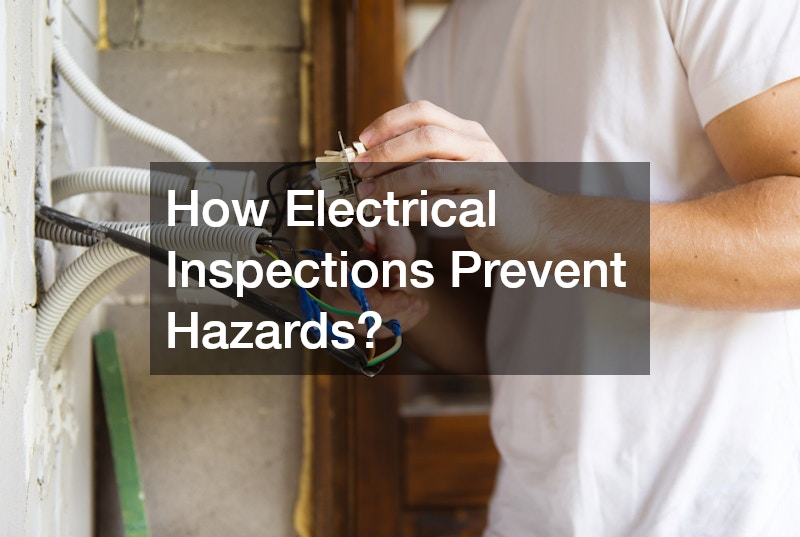Maintaining your home is essential for ensuring safety and prolonging property value. Conducting annual inspections is a key part of this maintenance strategy, helping you identify potential issues before they escalate into costly repairs. Over time, components of your home experience wear and tear, often in ways that aren’t immediately obvious to the untrained eye. Annual inspections provide peace of mind, confirming that systems are functioning as they should or pointing out areas that require attention. This article explores the ten key areas of your home that benefit from a full home inspection each year, ensuring that you stay ahead of potential issues.
- 1. Why Are Roof Inspections Important?
- 2. What to Look for in Foundation Inspections?
- 3. How Often Should HVAC Systems Be Checked?
- 4. What Makes Plumbing Inspections Necessary?
- 5. How Electrical Inspections Prevent Hazards?
- 6. How Septic System Inspections Protect Your Home?
- 7. What to Expect in a Basement Inspection?
- 8. Which Gutter and Drainage Issues to Watch For?
- Conclusion
1. Why Are Roof Inspections Important?

The Impact of Weather on Roof Health
Your roof is one of the most critical components of your home, as it protects everything beneath it from the elements. Over time, weather conditions such as heavy rain, snow, wind, and extreme temperatures can degrade roofing materials. Regular roof inspections help identify any wear and tear that may have occurred due to these factors. A damaged roof can lead to leaks, water damage, and even structural issues. By scheduling annual roof inspections, you can ensure that your roof remains in good condition, preventing costly repairs down the line. If you notice leaks or missing shingles between inspections, it’s a good idea to contact residential roofing services immediately.
Identifying Shingles and Structural Damage
During an inspection, roofing professionals will look for common signs of damage, including cracked, curling, or missing shingles. These issues can compromise the integrity of your roof and lead to leaks. It’s also important to check for structural damage that might not be visible from the ground. Professional inspectors will use special tools and techniques to evaluate the health of your roof, from its shingles to its supporting structure. For homes in areas prone to severe weather, this type of inspection is essential for maintaining a safe and secure home. Additionally, pests such as rodents or insects can sometimes enter through damaged roofing, making it important to also consider an exterminating service during your inspection.
Choosing Professional Roof Inspectors
While it might be tempting to climb onto the roof yourself, it’s best to hire a professional. Experienced roof inspectors have the right tools, training, and knowledge to spot issues that might otherwise go unnoticed. A reliable residential roofing services provider can also offer advice on necessary repairs or even the need for a full roof replacement if your roof is reaching the end of its lifespan. It’s essential to choose a certified and reputable roofing company that has a track record of thorough inspections and high-quality work.
2. What to Look for in Foundation Inspections?
Common Signs of Foundation Issues
The foundation is the backbone of your home, and issues with it can be costly and difficult to repair. Common signs that you may need a foundation inspection include cracks in the walls, uneven floors, and doors or windows that stick. These could be indicative of shifts in the foundation, which could lead to more serious problems if left unaddressed. A thorough foundation inspection by a general contractor can help you understand whether these signs are symptoms of minor issues or something more significant. Foundation problems can also affect your home’s structural integrity and safety, so it’s essential to address them as soon as possible.
Foundation Inspection Tools and Techniques
Foundation inspectors use specialized tools such as laser levels, measuring tapes, and sometimes even ground-penetrating radar to detect potential issues beneath the surface. These tools allow them to assess whether the foundation has settled unevenly or is showing signs of movement. The inspection may also include a detailed evaluation of the surrounding soil, as soil shifts can lead to foundation problems. It’s crucial to choose a contractor who has experience in foundation inspections and can provide an accurate assessment of any potential concerns.
When to Call a Foundation Specialist
If you notice significant cracks, shifts, or uneven settling, it’s time to call a foundation specialist. A general contractor may be able to identify some foundation issues, but for a thorough assessment, a foundation expert is recommended. They can offer solutions for stabilization or repairs, which will prevent further damage to your home. While foundation issues can be expensive to fix, catching them early through regular inspections can save you significant costs in the future.
3. How Often Should HVAC Systems Be Checked?

Recognizing Signs of HVAC Malfunction
Your HVAC system is essential for maintaining comfort in your home, especially during extreme temperatures. Annual inspections help identify potential issues before they turn into expensive repairs. Signs that your HVAC system may need attention include inconsistent temperatures, strange noises, or a noticeable decrease in air quality. Heating and cooling contractors can perform a comprehensive checkup of your system to ensure that it’s working efficiently. A poorly functioning HVAC system can increase energy bills and lead to discomfort, so regular maintenance is vital.
Understanding the Costs and Benefits of Inspection
While some homeowners may hesitate to pay for HVAC inspections, the cost of annual maintenance is far lower than the expense of an unexpected system breakdown. Regular inspections help maintain energy efficiency, prolong the lifespan of your system, and ensure that all components are functioning properly. HVAC maintenance typically includes cleaning the system, checking for leaks, and ensuring that the ducts are free of debris. Having this done annually by HVAC contractors ensures that you’re getting the best performance from your system.
Finding Certified HVAC Professionals
When hiring a contractor to inspect your HVAC system, it’s crucial to choose certified professionals. HVAC contractors should be licensed and insured, with a proven track record of high-quality service. Be sure to ask for recommendations and check online reviews to find a trustworthy company that can provide comprehensive inspections and maintenance for your HVAC system.
4. What Makes Plumbing Inspections Necessary?
The Role of Plumbing in Home Safety
Your plumbing system is essential for the health and safety of your home. Leaks, clogs, or faulty pipes can lead to water damage, mold growth, or even flooding, all of which can be hazardous to your home’s structure and your health. Scheduling regular plumbing inspections ensures that your system is functioning as it should, helping you avoid costly repairs. Local plumbing services can evaluate your pipes, water supply, and waste systems to make sure everything is in top condition.
Common Plumbing Problems and Symptoms
Common plumbing issues include slow drains, leaky faucets, low water pressure, or signs of water damage such as damp walls or ceilings. These may be early indications of more serious plumbing problems, such as pipe corrosion or hidden leaks. Regular inspections help identify these issues before they escalate. Local plumbing services can assess your system’s overall condition and recommend solutions to prevent future plumbing failures.
Preventive Measures to Avoid Plumbing Failures
Annual plumbing inspections also allow professionals to address minor issues before they become major problems. A drain cleaning company can help prevent clogs by clearing out debris that can accumulate in your pipes over time. Other preventive measures may include pipe insulation to protect against freezing in the winter or testing the pressure regulator to ensure it’s working correctly. Addressing small issues during an inspection can prevent costly repairs in the future.
5. How Electrical Inspections Prevent Hazards?

Common Electrical Faults in Households
Electrical faults are one of the leading causes of house fires, and they can be caused by outdated wiring, faulty outlets, or malfunctioning electrical panels. Regular electrical inspections help identify these hazards before they put your home at risk. Electricians can check your entire system, from the wiring to the circuit breakers, to ensure everything is up to code and functioning correctly. Early detection of electrical issues is key to preventing serious hazards, including electrical fires.
Checklist for a Comprehensive Electrical Inspection
A comprehensive electrical inspection will include checking the condition of wiring, ensuring outlets are grounded properly, and testing the safety of electrical panels. The inspector will also verify that there are no exposed wires and that all electrical components are compliant with current safety codes. Regular electrical inspections reduce the risk of power outages and dangerous malfunctions, giving you peace of mind that your home is safe from electrical hazards.
Hiring Licensed Electricians
For your safety, always hire licensed electricians for electrical inspections. Professionals who are licensed and insured have the training necessary to detect and fix issues without risking damage to your home. Avoid trying to inspect or repair electrical systems on your own, as incorrect handling can lead to serious injury or fires.
6. How Septic System Inspections Protect Your Home?
Recognizing Potential Septic System Failures
Your septic system plays a critical role in treating wastewater from your home, and like all systems, it can experience issues over time. Septic system failures can lead to unpleasant odors, backed-up drains, or even a sewage backup, which can cause extensive damage to your property and health risks. Signs that your septic system may be failing include slow drains, unusually lush patches of grass near the septic tank, or an unpleasant smell near your drain field. These problems are often the result of clogged pipes, overflows, or a failing drain field. Regular inspections can help detect these early warning signs, giving you the chance to fix issues before they become major problems.
Efficient Septic Maintenance Practices
Routine septic system maintenance can extend the life of your system and ensure that it’s working efficiently. Inspections typically involve checking the tank’s level, looking for blockages, and verifying that the effluent filter is functioning. If necessary, the system may be pumped to remove sludge and solid waste. Ensuring that your septic system is in top condition helps avoid more severe and costly repairs, such as replacing the drain field or repairing a collapsed tank. Scheduling regular inspections with a professional ensures that your system stays in optimal working condition, and septic tank services can recommend additional maintenance measures to prolong its lifespan.
Professional vs. DIY Septic Inspection
While you can take basic steps like monitoring for signs of failure or keeping an eye on water usage to avoid overwhelming your septic system, professional inspection by septic and water heater services is essential for a thorough assessment. A certified septic inspector will have the tools and experience to identify underlying issues that might not be visible to the homeowner. Unlike DIY inspections, a professional will also be able to evaluate the health of the soil around the septic tank, which can be critical in avoiding drain field failures. Choosing a professional for your septic inspection ensures that your system is evaluated with care and attention, preventing potentially disastrous issues down the line.
7. What to Expect in a Basement Inspection?

Common Basement Moisture Problems
Basements are particularly prone to moisture problems, which can lead to mold, mildew, and structural damage. During a basement inspection, professionals will look for signs of water infiltration, such as damp walls, floors, or ceilings, and check for cracks or leaks in the foundation. Common issues include condensation, poor drainage around the foundation, or an improperly sealed basement. Addressing moisture problems early on can prevent long-term damage to your home’s structure and reduce the risk of mold growth. Inspecting the basement regularly is a proactive way to ensure your home’s foundation remains dry and strong.
Basement Structural Integrity Assessments
In addition to moisture issues, basement inspections also focus on assessing the structural integrity of the space. This includes checking the foundation walls for cracks or signs of shifting, which could indicate problems with your home’s foundation. Inspecting support beams, posts, and other structural components is also essential to ensure the stability of your basement and the home as a whole. By identifying structural problems early, you can avoid more serious and costly repairs in the future. If you notice any unusual shifting or settling, a general contractor should be called in to evaluate the situation and determine the best course of action.
Resolving Basement Leaks and Dampness
If moisture problems are detected during your basement inspection, there are several ways to address them. Siding contractors may need to inspect the exterior walls for cracks that might be allowing water to seep through. You might also need to install or repair a sump pump to divert water away from the foundation or add proper drainage solutions to prevent further moisture buildup. Waterproofing your basement is another option, which can involve applying sealants or installing drainage systems designed to keep your basement dry. By addressing basement leaks and dampness during an inspection, you can prevent the spread of water damage to other areas of your home.
8. Which Gutter and Drainage Issues to Watch For?
Consequences of Poor Drainage Management
Proper drainage is essential to the health of your home. When gutters and downspouts are clogged or damaged, water can overflow and seep into the foundation, leading to flooding, mold, and structural issues. Poor drainage management can also damage your landscaping, erode your foundation, and create a haven for pests. It’s essential to schedule annual inspections to ensure that your gutters are clean and functioning properly. This prevents the buildup of debris that could lead to clogs or the development of rust and corrosion in older gutters. Proper drainage management is crucial for protecting your home from water damage.
Effective Methods of Gutter Cleansing
During an inspection, professionals will assess the condition of your gutters and downspouts, ensuring they are clear of debris like leaves, twigs, and dirt. Clogged gutters can cause water to back up and spill over the edges, which can lead to damage to your roof, siding, and foundation. A drain cleaning company can help remove blockages from gutters and downspouts, ensuring that water flows freely away from your home. Additionally, professionals will check the condition of the gutters to determine if they need to be repaired or replaced. Cleaning and maintaining your gutters on a regular basis will prevent water damage and preserve your home’s exterior.
Choosing Services for Gutter Inspection
When it comes to gutter inspections, it’s best to choose a service that specializes in gutter maintenance. Professionals will not only clean your gutters but also inspect them for signs of wear or damage. They’ll check for issues like sagging, rust, or improper alignment, which can prevent gutters from functioning correctly. Hiring a professional to perform regular gutter inspections ensures that your home is protected from water damage. Additionally, some companies offer gutter guard installation to help prevent debris from accumulating in the first place, saving you time and hassle in the long run.
Conclusion
Routine inspection of your home’s critical components is not merely a precaution but a necessity. From the roof to the plumbing, from the HVAC system to the electrical wiring, each part of your home plays a crucial role in its overall safety and efficiency. Annual checks can significantly enhance your home’s comfort and safety while averting potential expenses. Implement a regular, full home inspection schedule to ensure these vital areas remain in optimal condition, allowing you to address small issues before they turn into expensive repairs. Whether you’re hiring residential roofing services, scheduling a plumbing check, or calling in HVAC contractors, taking proactive steps will save you time, money, and peace of mind in the long run.
